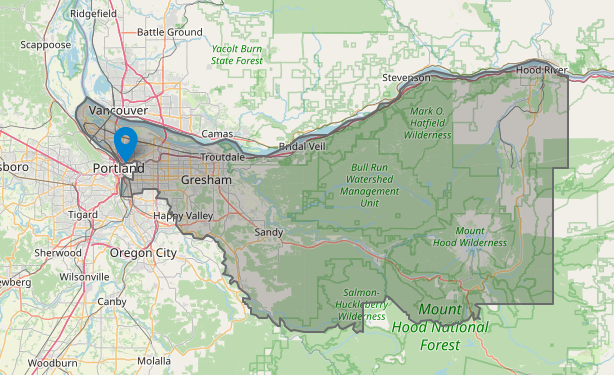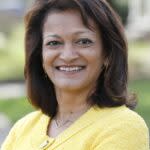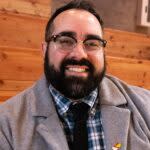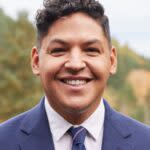Q&A: Democratic candidates for 3rd Congressional District answer our questions
- Oops!Something went wrong.Please try again later.
- Oops!Something went wrong.Please try again later.

The 3rd Congressional District spans parts of Multnomah County and Clackamas County and all of Hood River County.(U.S. House of Representatives)
The retirement of longtime Oregon congressman, Rep. Earl Blumenauer, has opened up Oregon’s 3rd Congressional District seat and drawn 10 candidates: seven Democrats and three Republicans.
The district stretches from Portland to the east and includes most of Multnomah County, parts of Clackamas County along with Hood River County. Democrats represent 44% of registered voters in the district, and Republicans represent 14%, according to the latest voter registration numbers published by the Secretary of State’s Office. Unaffiliated voters account for 36% and many of them vote for Democrats. That means that whoever wins the Democratic primary is likely to represent the district in Congress for the next two years.
The Capital Chronicle profiled the top three Democratic candidates for the district – Maxine Dexter, Susheela Jayapal and Eddy Morales – and is publishing two sets of answers from all the candidates in the race who responded, based on their party.
The seven Democrats competing in the primary are: Ricardo Barajas, Nolan Bylenga, Maxine Dexter, Susheela Jayapal, Michael Jonas, Eddy Morales and Rachel Lydia Rand. All responded except Barajas, who is not included.
Here are the answers from the Democratic candidates:
Q. Why are you running to represent Congressional District 3?
Bylenga:
I’m running for Congress because I’m concerned about the state our country is in. America has become the epicenter of division and corruption, and because of it, Americans have become demoralized. We have watched our political system become captured by money and special interests, while the rest of us have gotten screwed by bad policies that often make our broken system worse. What’s even worse is that our politicians have become slaves to dogmatic ideologies. Because of this, we no longer have an effective government, and our freedoms are slowly whittling away.
The truth is, the more that time goes on, the more I fear for the future of America. We are now on the verge of another war, and Americans are terrified at what the future holds. I believe that if done right, the future holds incredible potential. It however will take a new generation that stands up and demands that we create a great future. I’m running to make that demand.
Dexter:
I’m running for Congress to bring my unique blend of personal experience and professional expertise to Washington, D.C. where I will continue to do what I do best – listening, leading and getting things done for the people of Oregon.

Maxine Dexter (Campaign photo)
I have cared for the people of CD3 as a pulmonary and critical care physician for over 15 years, through some of the most challenging times in our history. Our children were in PPS schools in CD3 through middle school and during that time I was a core leader and organizer for our schools and community. As a state lawmaker since 2020 I have proven that I will care for my district with compassion, courage and commitment and am known for getting hard things done. I know the impact I can have as a lawmaker and I will go to Congress to do all I can to be sure every American can live a healthy life, in a healthy community, in a healthy environment.
Jayapal:

Susheela Jayapal (Campaign photo)
We’re at a pivotal moment – in this district and in the country. We’ve emerged from the pandemic with extremists attacking our democracy in ways we’ve never seen before; with rights we’ve taken for granted for decades being rolled back; and with progress we have made in recent years – like rebuilding our infrastructure and health care access – threatened by MAGA ideologues. And we’re also facing immense challenges on the ground locally, particularly with homelessness and behavioral health.
I’ve been honored to serve Multnomah County for the last five years, during one of the most difficult times in recent memory. And it’s clear that in order for Oregonians to thrive, we need strong leadership at the federal level. I want to go to Congress to carry on the work I’ve been doing at the county and before that: tackling our homelessness crisis; fighting for living wages and good, safe jobs; ensuring that all our communities, particularly those that historically have been marginalized, have the resources and policies that allow them to thrive; and working with community members to create safe neighborhoods.
And I also want to fight for our democracy, for reproductive rights, for common sense gun safety, for humane, effective, and comprehensive immigration reform, and for a planet that will sustain and support our children and their children.
I believe that while we face great challenges, we also have great opportunities; and that we can find common ground without compromising our values.
Jonas:

Michael Jonas (campaign photo)
I’m running for Congress in District 3 because I’m a creative and collaborative problem-solver. I’m also running, because probably similar to you, I’m fed up with the long list of issues America has but doesn’t seem to solve.
My campaign slogan is “Love, Science, Plans. And Action.” Thoughts and prayers are meaningful, but they’re not enough. Wishful thinking is great, but it’s not forward moving by itself. Our country needs plans based on research, evidence, and data that lead to intentionally implemented actions.
Morales:
My story starts with my mom who came to this country from Mexico, crossing the border hidden in the trunk of a car because she wanted better opportunities for her children. She brought us to Oregon to escape domestic violence, and I started to learn English in school. Although mom was never able to learn the language or earn her citizenship because of our broken immigration system, she never stopped helping people.

Eddy Morales (campaign photo)
This is the spirit that led me to start organizing when I helped farmworker women orchestrate a boycott of PicSweet mushrooms to fight for better working conditions. This success taught me how working people can come together with a goal, work for change and build power.
I continued organizing as a student at the University of Oregon and established a housing code in the city of Eugene. My first job out of college was with the U.S. Student Association, where we fought for public education, abortion rights, for living wages and for the rights of DREAMers.
During my six years on the Gresham City Council, we created multi-generational affordable housing so families can live under the same roof. We also worked to pass new funding and strict accountability standards for our police to ensure that our communities were safe.
This is a moment that calls for acts of solidarity from each of us — to tackle our toughest challenges. I have been organizing around these issues for my whole life and want to take that fight to Congress.

Rachel Rand (Campaign photo)
Rand:
I’ve been developing ideas for addressing climate change for several decades. My politics are on the national and even world level, so I’m running for the U.S. House to introduce my ideas to our federal politicians. My platform is based upon living locally.
Q. What in your background makes you the best candidate for this job?
Jayapal:
I bring a unique combination of personal, professional and civic experience, deep district ties and passionate commitment to the district’s progressive values, all of which make me the best choice for Congress.
As an immigrant, a woman of color, a mom – I bring perspectives from communities that are underrepresented in Congress. My roots in the district run deep: I’ve lived here for 30 years and raised two kids who graduated from Grant High School. I’ve built relationships and trust with community leaders, families and fellow advocates who represent the diversity of this district. These relationships are reflected in my 100-plus endorsements from local leaders and organizations who form the coalition essential to the most effective representation in Congress.
I’ve been a lawyer, a community leader and volunteer, and most recently, a Multnomah County commissioner. In some of the most challenging years we’ve faced, I leveraged the position to deliver concrete services and resources to my constituents: I’ve been recognized for my leadership in supporting survivors of domestic violence; strengthened support for immigrant and refugee communities; secured federal funding for innovative community-led crime prevention initiatives; and much more. This wide scope of experience and skills position me to be effective across the wide range of issues Congress tackles, and to navigate the complicated dynamics of the position.
I am an unabashed advocate for the progressive policies this district supports: Medicare for all, a just transition to a green economy, a humane foreign policy, federal investment in public housing and much more.
Jonas:
I’m a community business attorney with an MBA and a nonprofit board volunteer. I get in and change structures and encourage businesses to profit while considering social enterprise models. In 2023, I was one of Portland Business Journal’s 40 under 40 honorees. I was also chosen by the (Small Business Administration) as Oregon’s “Small Business Champion of the Year.” I’m old enough to have critical lived experiences that will make me excellent at the job, but I’m young enough to build seniority in Congress and make lasting impacts for Oregonians.
Dexter:
I’m the only lawmaker in this race and have proven I’m effective at getting hard things done. Colleagues refer to me as the hardest working lawmaker in Salem. Throughout my life I have accomplished every major achievement I have set my mind to whether it was being the first in my family to graduate from college, becoming a physician, being selected as a chief resident, being the first woman to be chair of the board of the largest physician group in the Northwest, winning a competitive four-way primary in 2020 or being the state lawmaker who led our chamber to pass back to back historic housing packages. I am good at doing hard things because I am focused, resilient, indefatigable and as my son says, “annoyingly optimistic”.
As a pulmonary and critical care physician, caring for patients in CD3 for more than 15 years, I know what our community members are facing at every socioeconomic level. I see what people are struggling with, and that informs the way I make policy. We need someone in Congress who has proven they will listen to different perspectives, evaluate the information and data and then effectively work with others to get things done. I am committed to keeping my constituents at the center of my decisions – the same way I do when caring for my patients. Now, I am ready to care for my community knowing I will be able to make a much greater impact as a lawmaker in Congress.
Rand:
I’ve been writing about politics daily for over a decade. I’ve been honing these ideas of working from home, what to do about our energy problems, what to do about transportation and agriculture. I’ve had several brushes with fame as a jazz musician. I played a concert with Ray Charles, I played trombone in the U.S. Navy for both of the Clintons. I’ve played music on aircraft carriers and I’ve played improvised jazz regularly for admirals on the largest Navy base in the world. And so much more has happened in the last 24 years of my life. I’ve written over 500 pages just about my life. I can speak confidently about my platform to just about anyone and I’m a seasoned improviser.
Morales:
I first learned about organizing by watching my mom. Raised by a hardworking and community-minded immigrant woman in Oregon, I saw her share meals and offer basic necessities to neighbors in need. It was through moments like these I learned how her choices were strengthening the entire community.
I started my organizing career as a student helping coordinate a boycott in support of farmworkers being paid unfair wages. After seeing the impact of solidarity, it quickly became my life’s work. Since then, I’ve organized to help pass the (Affordable Care Act) and establish (Deferred Action for Childhood Arrivals) DACA, restore voting rights in Florida, support immigrants under attack in Arizona, and (I) worked with Stacey Abrams to flip Georgia blue. I brought these lessons home, where I founded East County Rising and joined the board of Planned Parenthood. As a six-year city councilor in Gresham, I helped create multi-generational affordable housing, increased public safety solutions and advocated for underrepresented constituents. Through this work, I’ve learned what it takes to bring people together to reach a common goal.
With the chaos, dysfunction, and far-right extremism in DC — there’s never been a more important time to send an experienced organizer to Congress. What worked in Gresham is good for Oregon. What is good for Oregon is good for the country.
Bylenga:
Our federal elected officials have become nothing more than paid actors. They have staff members write their platforms, their questionnaires, their speeches, literature, etc. For many of them, their staff members are provided to them by special interest groups that determine the platforms themselves, fund the campaigns themselves and dominate the election front. These special interest groups have become the puppeteers of the politicians, starting from the point that they are candidates.
I have none of these backers. While other candidates’ answers are written by Super PAC employees and staff members, my answers are written by myself, with no hidden agenda behind it, and no money forcing me to say something I don’t believe in.
I also believe in building bridges. America is becoming more and more divided, and if we are to sustain, we must reunite the country. In the past, I managed to help lessen tensions between divided communities in eastern Oregon. Ultimately these efforts led to conservative Umatilla County Commissioners issuing a proclamation that dedicated the county to solving racial injustice. Many people were in awe from this outcome.
I’m once again looking to unite Americans and bridge the divide.
I also want to see Americans become dreamers again. America is a nation of true believers who truly do believe in the impossible. I wish to spread that sentiment to all Americans, and inspire them to go after their dreams.
Q. What are the top three issues you plan to focus on and why?
Jonas:
Houselessness and livability: Without stable housing, individuals face numerous challenges that affect their well-being and ability to thrive. Therefore, I am committed to implementing comprehensive solutions that address the root causes of houselessness and provide stable housing, wrap-around support services, workforce training and pathways to long-term stability. For those who can afford housing, there is not only a shortage; housing often labeled as “affordable housing” doesn’t match the economics of the region. If housing requires two jobs and/or an unexpected medical bill causes someone to lose access, it shouldn’t be deemed “affordable” or “stable”.
Women’s health and reproductive rights: Women’s health and reproductive rights are fundamental human rights that must be protected and upheld. Access to comprehensive reproductive health care, including contraception and abortion care, is essential for ensuring women’s autonomy, health and well-being. I am a steadfast advocate for these rights and will fight tirelessly to federally codify them.
Climate action and stewardship: The climate crisis poses significant threats to our planet’s stability and the well-being of future generations, with far-reaching implications for our environment, economy and society. Urgent action is needed to mitigate the impacts of climate change and protect our planet for future generations. Therefore, I am committed to advocating for bold climate policies that prioritize renewable energy, environmental conservation, workforce training program development and lift marginalized communities. By investing in sustainable practices and transitioning to a low-carbon economy, we can mitigate the worst effects of climate change and safeguard our natural resources.
Rand:
At the root of all our problems is the simple math that oil will run out. We pave our roads and shingle our houses with it. It is unlikely that we are going to “sustain” a population of 8-10 billion people with this emerging “lithium economy”. I’m suggesting that Generation Z have just one child per two women. If we can sustain that rate for 40 years, then we should be able to shrink our population to 2 billion by 2100. My platform is based on giving Generation Z what they need to accomplish this goal. I want to protect them from having to cater to a larger, aging population.
Morales:
Affordable Housing: Growing up my family was housing insecure, and my mother would exchange child care for a place for us to live. Most affordable housing being built does not meet families’ needs. In Gresham, I built multigenerational housing with four bedrooms so aunties, uncles and grandparents can live with each other. We’ve also created workforce housing for people with disabilities, designed by people with disabilities, that is run on solar so their energy is cheaper and greener.
Public Safety: I’ve lost two brothers to gun violence. That’s why I worked to create a first-of-its-kind Youth Violence Prevention Program partnering with community groups to address the root causes of crime in our communities. And on (the) Gresham City Council, I worked to bring funding for police training and retention, while supporting strict accountability and transparency for officers to improve community relations. In Congress, I will fight for the resources we need to keep our communities safe.
Defend and expand our rights: LGBTQ+ rights, reproductive rights, immigrant rights and countless others are under attack. In Congress, I’ll continue organizing and fighting to protect and expand access to birth control, abortions and reproductive health care, and to ensure families like mine are protected and everyone in America can live their lives with respect and dignity.
Bylenga:
Three big issues I plan to focus on are: criminal justice reform, our broken election system, and the forever wars.
The United States incarcerates more people than any nation in the world. It’s no secret that mass incarceration has a stronghold on American politics. How can we call ourselves the land of the free if we imprison more people than any other nation? It’s time we invest in services such as mental health, and build a safe, effective, and fair justice system.
Our election system is another big issue. Why is it that the population supports policy for health care, the environment, education and more, but it never gets passed? It’s because our elections are purchased by special interest groups that have their own agenda. Big money controls our elections and ensures that only the policies wanted by the special interest groups get passed. It is very unlikely that voters get the legislation they want until big money is taken out of elections, and elections are made fair.
Lastly, the forever wars. The U.S. has been at war Gen Z’s entire lives. We are constantly funding, supporting and profiting off of wars. I believe that it’s time we end the forever wars and support international diplomacy rather than mass killing. I would like to see America become the city on a hill and a moral authority to the world. We cannot be that unless we start pushing for peace. I believe that peace is possible.
Jayapal:
Shared prosperity: Everyone should be able to afford a roof over their head, food on the table and health care. Everyone should be able to take care of their children and their elders. I’ll focus on pathways to living wage jobs, ensuring a thriving labor movement, affordable child care, behavioral health infrastructure and investments in public and affordable housing.
Climate change: I will push for the U.S. to transition away from fossil fuel production and to invest in clean energy infrastructure and good, living wage jobs to create that infrastructure. We also must create resilience for frontline communities: this means investments in wildfire management and relief as well as strategies such as tree planting, heat pumps and resilience hubs. Finally, our climate change agenda should be woven into all our other priorities, including housing. I’ll advocate for Sen. (Bernie) Sanders’ Green New Deal for Public Housing, which proposes transformational investments in new, energy-efficient public housing and the workforce required to create it.
Democracy and civil rights: The health of our democracy is the most important thing we have. Without it, nothing else works. I am committed to fighting for equal rights for each and every Oregonian as well as structural change to ensure a healthy democracy. This includes fighting for reproductive freedom: I was able to get an abortion when I needed one, and every woman should have that right.
Dexter:
In the state Legislature, I found common ground to successfully secure historic housing investments, improve public safety, expand abortion rights, protect the environment, improve health care access, increase addiction treatment, and close firearm law loopholes. When I help patients struggling to afford care they need or to make ends meet, I see these victories aren’t enough. We need an effective progressive who will get results in Congress. I will use my experience as a physician and lawmaker to:
Address our homelessness and addiction crises: Our homelessness issues are related to a lack of affordable housing as well as too little investment in our public safety net that includes mental health, addiction and shelter services. In Congress, I will champion investments in housing as public infrastructure while spearheading the development of affordable, climate-resilient housing projects and supportive housing. We must increase federal investments in addiction and mental health services including the workforce we need to deliver the care our community needs.
Ensure healthy communities: Our health care focus must be on providing accessible, universal health care that includes full abortion care and tackling provider shortages. The climate crisis demands a dual approach: adaptation and mitigation. I’ll champion a swift transition to 100% renewable energy while expanding high voltage transmission capacity, and holding corporations accountable for environmental pollution.
Rebuild a fair economy with opportunity for all: Fight for high-quality schools, universal pre-K, affordable child care, good-paying union jobs and a lower cost of living. My legislative record lays the groundwork for my continued advocacy in Congress.
Q. You are likely to serve in a divided House. How do you plan to approach that?
Jonas:
In a divided House, I will prioritize collaboration, action-oriented initiatives, and firm stances on key priorities:
Collaboration: I will seek bipartisan cooperation to advance legislation benefiting our constituents and addressing issues like houselessness, health care, climate change and education.
Action-oriented: I will focus on tangible actions, introducing legislation with clear objectives, mobilizing support, and taking bold steps to address urgent needs.
Firm stances: I will stand firm on core principles, including protecting reproductive health care, combating climate change and ensuring education access for all.
My approach aims for real results by bridging divides, taking decisive action, and staying true to my constituents’ values.
Morales:
I have dedicated the last 25 years of my life organizing with working families to make concrete improvements in their lives. I’ve worked in Oregon, across the country and in Washington, D.C. on the Affordable Care Act, comprehensive immigration reform, electing progressives to office and supporting organizers in their local fights. The only way to cut through the chaos and dysfunction in Washington, D.C. is through engaging and organizing communities directly impacted by the policies we hope to change.
I know how to mobilize a community and have them present their concerns to policymakers, and my career has been staked on building broad coalitions to win. In Congress, I will bring the voices of those most impacted by an issue to advocate for solutions and tackle it head on. It’s what I did to help pass the ACA and establish DACA. It’s how we were able to build affordable housing and tackle gun violence here in Gresham. And it’s how I will work every day to deliver for Oregonians.
Dexter:
Just as I have in the Oregon Legislature, by being ready to learn from my colleagues, constituents and staff, being intentional about defining the problems we can all agree need to be solved and then focusing on where we are aligned and can work together to minimize conflict and maximize efficiency. Portland and the entirety of CD3 are struggling with many issues that need to be addressed effectively and from all levels of government. Our next member of Congress from CD3 must be prepared to be effective on day one. As the only lawmaker in this race, I am. My experience serving as a lawmaker in a contentious Legislature and still achieving significant success in passing historic and impactful legislation with strong bipartisan support, I am uniquely qualified to represent our community. In the Legislature, I have been effective by being committed to building relationships broadly, listening attentively to as many sides of the issues as possible, and then leading clearly and courageously to a successful outcome. I also understand that the work of a lawmaker isn’t just about passing laws – it importantly includes excellent constituent services and leading in partnership with local and state leaders to maximize investments and effective action on the issues at hand. I have proven an ability to listen, lead and get things done and will hit the ground running on day one in D.C.
Jayapal:
I know how to bring people together to work across their differences and tackle hard issues.
Earlier this year, I spent several days visiting a conservative commissioner in Union County. I wanted to learn first-hand the struggles of the rural communities he represents, to better understand whether, where and how we might work together. And he came to Multnomah County so he could learn more about us. Through those experiences, we agreed that while our counties have differences, they also have shared challenges and opportunities. And we forged a relationship that I believe will allow us to find common ground, even on difficult policy issues.
Working across differences starts with being absolutely resolute and grounded in our values, while also being open to learning, and leading with curiosity – seeking to understand others’ priorities and experiences. I’ve used that approach to bring groups together to tackle hard problems – from chairing a legislative task force on transitioning away from diesel, which included opposing interests; to convening community groups on public safety; to working with the Gresham Police Department on creating a diversion program for low level crime.
I’ll take the same approach in Congress – staying firmly rooted in my values, while building the relationships necessary to find common ground.
Bylenga:
I plan to unite Americans. It is important that we move past dogmatic ideologies and return to an America where we can simply come up with good ideas and debate them. Today, if one party owns a good idea, then the other party will almost certainly reject it. It’s time we put an end to this hyper partisanship and support ideas that are good. There are certainly things I’d like to see, such as a clean planet, affordable housing, affordable education, affordable health care and more, and there may be a time when voting requires some sort of partisanship.
That is simply the reality.
What I will do, however, is look for new solutions that aren’t yet claimed by either party, and I will work on them specifically with folks from the opposite party, bypassing partisanship. Both parties can get credit for good policy. This can get us to start solving the issues.
Rand:
No law can be made to reduce population, so I’m attempting to be highly visible in the national media by being elected to Congress. I’m a transwoman, jazz musician, software engineer, curry chef proposing a radical shift from this lithium economy meme. If I’m elected, I will be visible. If Generation Z can take action, then we have a real world movement. My website is full of proposals and bills that I will put into the hopper to get us on track quickly.
Q. What are three goals you would like to accomplish by the end of your term?
Rand:
I’d like to see enough traction in the national media to see the birth rate significantly declining. I will introduce a bill I’m humbly (LOL) calling “Rand’s Law” which is an expansion of the SNAP program. It would allow everyone living in households earning less than $60,000/year to be on food stamps with no work requirement. Policing food stamp policies and having someone harping on you to get a job when you are hungry is inhumane. Not fun for anyone and people driving to work and to meetings causes climate change. We’ve been hearing the political rhetoric all our lives of a growing economy and full employment. Human activity causes climate change. I’m crafting a better path.
Bylenga:
Three goals I would like to see accomplished include ending mass incarceration, taking money out of politics, and ensuring that God’s green earth is preserved.
There are many, many other things, like evening out inequality and lifting Americans out of poverty.
I would also like to have a legacy of uniting Americans and bridging the divide. I am fond of a quote by St. Francis of Assisi, where he says “Where there is hatred, let me sow love. Where there is injury, pardon. Where there is doubt, faith. Where there is despair, hope. Where there is darkness, light. Where there is sadness, joy.” I hope to do the same. It will not be easy, but Americans have always managed to do great and amazing things when pursuing our morals and ethics. I believe we can do it again.
Morales:
I would like to make measurable progress on affordable housing, public safety and protecting and expanding our fundamental rights.
But I am also reminded that as a young boy, I never saw an elected official that looked like me or even dreamed of representing my community. Over the past 25 years of my organizing work, I have really come to understand the great importance of representation. As a first generation American and a Queer Latino, I have taken space at the table, brought others to the table, and advocated for myself and other people that have similar experiences as me.
One of my proudest moments was when I was elected to represent my community in Gresham on the City Council. I have lived everyday in the past six years working hard to be deserving of that support and to increase the power of our community.
I am running to represent Oregon’s 3rd Congressional District so that young boy from all those years ago can finally be represented. In two years, as the first LGBTQ+ and person of color to serve in Congress from Oregon, I hope that my impact is measured by tangible improvements in Oregonian’s lives.
Jonas:
With my mediation, legal and business negotiation skills and experience, I aim to do hard work passing legislation tied to moral imperatives, ultimately leaving a legacy of effective governance and positive change for the people I represent including passing these three items of legislation:
Affordable Housing Credit Improvement Act: Enhancing the Low-Income Housing Tax Credit to stimulate affordable housing development.
Women’s Health Protection Act: Safeguarding access to abortion care and preventing restrictive state laws.
Clean Future Act: Setting ambitious targets for reducing carbon emissions and transitioning to renewable energy.
These legislative initiatives represent tangible steps toward addressing the most pressing issues facing Oregonians.
Dexter:
I understand that as a freshman, much of my first term will be focused on continuing Rep. Earl Blumenauer’s legacy of providing strong constituent services that lift up our community and show how government can work for them; and building relationships with my Democratic and Republican colleagues that will yield dividends down the line.
On the legislative side, my top priority will be tackling the housing and homelessness crisis on our streets. I look to partner with Sens. Ron Wyden (of Oregon) and Maria Cantwell (of Washington state) on expanding the low-income housing tax credit and securing federal funds to assist state and local government plan for and build more housing. I will also fight to bring my bipartisan opioid harm reduction package from the 2023 legislative session to D.C. We are seeing the impacts of fentanyl across the country from the streets of Portland to Louisville – it is imperative that states have the tools they need to fight this crisis from test strips to bulk purchased opioid reversal medication and medication-assisted therapy including to those incarcerated who continue to be denied access to constitutionally required care. Finally, I want to make sure I effectively assist in getting the I-5 bridge replacement investments maximized and effectively used to make sure our region safely maintains this Columbia crossing for decades to come.
Jayapal:
By the end of my time in Congress, I’d like to:
Bring substantial federal resources to the district, particularly for physical infrastructure, climate resilience, housing and homelessness, and behavioral health.
Take legislative and policy action to support access to affordable housing, universal single payer health care, the transition away from fossil fuels, strengthening labor protections and the right to organize, supporting care infrastructure and reproductive rights.
Provide strong, responsive constituent services that meet the day to day needs of residents of the district in obtaining federal services and resources.
Use the platform of congressional office to be a strong, clear voice for the values of this district on broad issues such as democracy and civil rights.
GET THE MORNING HEADLINES DELIVERED TO YOUR INBOX
The post Q&A: Democratic candidates for 3rd Congressional District answer our questions appeared first on Oregon Capital Chronicle.
